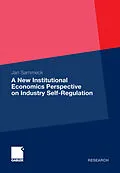The idea of self-regulation as an instrument capable of mitigating socially undesirable practices in industries - such as corruption, environmental degradation, or the violation of human rights - is receiving substantial consideration in theory and practice. By approaching this phenomenon with the theory of the New Institutional Economics, Jan Sammeck develops an analytical approach that points out the critical mechanisms which decide about the effectiveness of this instrument. By integrating theory with practical examples of self-regulation, this study highlights the necessity to look at the institutional incentives of an industry, in order to come to a sound judgement about the feasibility and effectiveness of this instrument in a given situation.
Autorentext
Jan Sammeck is a research associate at the Dr. Werner Jackstädt Chair of Economic and Business Ethics at Handelshochschule Leipzig, where he also obtained his doctorate.
Inhalt
A Concept of Demand for Industry Self-Regulation.- The Supply of Self-Regulation.- The Incorporation of Concept und Context.- Implications of an Institutional Approach to Self-Regulation.?
